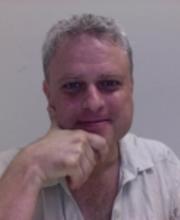Erik Curiel
Biography
I earned my A.B. (honors) as a double major in physics and philosophy at Harvard University, under the supervision of Profs. Hilary Putnam, Robert Nozick and Sheldon Glashow. I earned my Ph.D. in philosophy from the University of Chicago, working with Profs. David Malament and Howard Stein in philosophy and Profs. Robert Geroch and Robert Wald in physics. During my time in Chicago, I took the full load of classes that a physics graduate student would take, and spent three years with an office working as a graduate student in the Relativity Group at the Enrico Fermi Institute of the University of Chicago’s Physics Department. I have held teaching and research positions at Stanford University, the Center for Philosophy of Science at the University of Pittsburgh, the London School Of Economics, Trinity College (Cambridge University), and the Rotman Institute of Philosophy at the University Of Western Ontario. I am currently assistant professor at the MCMP. I think this is all pretty good for a kid originally hailing from Dallas, Georgia, a hamlet in the deep rural American South.
I was trained both as a philosopher and as a theoretical physicist because my interests include not only issues in each discipline separately but, even more, the overlap of the two. This comes not only from the philosophical side—so much of theoretical physics today is done in the absence of constraint by experimental data that it often resembles traditional philosophy, grappling with such issues as the nature of space and time, the character of physical quantities such as the entropy of a black hole, and even the appropriate scope and foundation of physical theory itself, being driven by conceptual analysis and Gedankenexperimente alone. My current work in these areas focuses on the intersection of general relativity, quantum field theory and thermodynamics, primarily in the physics of black holes, early-universe singularities, and related gravitational phenomena. In general philosophy of science, I work primarily on the semantics of scientific theories, where I grouse a lot about the inadequacies of the semantic view of theories, and try to work out my own account. On the purely philosophical side, I spend a fair amount of time working on the ancient Greeks, just because I love them, and on the history of 20th century analytic philosophy. On the purely physics side, I enjoy working on the mathematical foundations of classical mechanics and various problems in classical general relativity. Really, though, I love to think and talk about almost anything—I fervently hold with Plato that all true philosophy happens in conversation. “Brotherhood of men comes not from community of thought but from consanguinity of mind.”—Proust.

